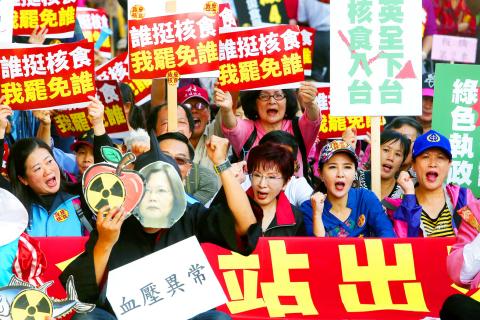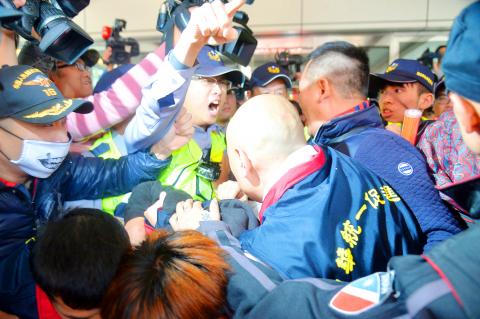The Chinese Nationalist Party (KMT) yesterday took to the streets of Taipei, threatening to recall any lawmakers who voice support for the lifting of the nation’s import ban on Japanese food products from five Japanese prefectures, urging President Tsai Ing-wen’s (蔡英文) administration to provide the public with an explanation.
Taiwan imposed import restrictions on food products from Fukushima, Ibaraki, Tochigi, Gunma and Chiba prefectures following the meltdown at the Fukushima Dai-ichi nuclear power plant on March 11, 2011.
Addressing a rally against the relaxation of the ban outside the Chiang Kai-shek Memorial Hall MRT Station in the afternoon, KMT Chairwoman Hung Hsiu-chu (洪秀柱) accused Tsai’s administration of caving in to Japanese pressure and “forcing radiation-contaminated foods down the throats of Taiwanese.”

Photo: CNA
“We do not understand the Democratic Progressive Party’s [DPP] sudden flip-flop; we do not understand why the government is forcing people and their children to consume radiation-tainted food; and we do not understand … why we have to import radiation-contaminated food products just because of pressure from Japan,” Hung said.
Despite opposition to nuclear power plants being one of its major policy platforms, the DPP on one hand says all of Taiwan proper could be affected in the event of a nuclear disaster, but on the other says that the import of Japanese foods, except those from Fukushima, should be allowed, Hung said.
Hung then led the protesters in chanting slogans such as: “Whoever supports radiation-tainted foods will be recalled” and “opposing radiation-affected foods to save our kids; opposing radiation-affected foods to save ourselves; opposing radiation-affected foods to save Taiwan.”

Photo: CNA
The protesters then marched to Ketagalan Boulevard in front of the Presidential Office Building, before heading toward the Ministry of Finance, which is next to Tsai’s official residence.
The demonstration took place concurrently with a referendum signature collection event held just a few hundred meters away organized by KMT Vice Chairman Hau Lung-bin (郝龍斌), who is reportedly interested in running against Hung in the KMT’s next chairperson election in May next year.
Asked whether the two separate events suggested disagreement between her and Hau, Hung dismissed the idea, saying that KMT headquarters welcomed the referendum drive initiated by Hau on the import ban.
Earlier yesterday, Hau and other KMT officials mobilized hundreds of supporters to boycott the first extra public hearings an lifting the import ban held by the Executive Yuan in New Taipei City’s Sindian District (新店) in the morning.
“The purpose of a public hearing should be to solicit the opinions of all sectors of society before deciding whether to allow imports of Japanese foods from radiation-affected areas,” Hau said. “If the public hearing is merely used by the government to brief or convince the public, we will definitely not accept it.”
The Executive Yuan arranged three extra public hearings on the import ban — scheduled for yesterday, Monday next week and Jan. 8 — after the previous 10 hearings that took place last month were criticized as being held in a hasty manner.
However, the hearing yesterday was disrupted by scuffles and verbal clashes.

ANOTHER EMERGES: The CWA yesterday said this year’s fourth storm of the typhoon season had formed in the South China Sea, but was not expected to affect Taiwan Tropical Storm Gaemi has intensified slightly as it heads toward Taiwan, where it is expected to affect the country in the coming days, the Central Weather Administration (CWA) said yesterday. As of 8am yesterday, the 120km-radius storm was 800km southeast of Oluanpi (鵝鑾鼻), Taiwan’s southernmost tip, moving at 9kph northwest, the agency said. A sea warning for Gaemi could be issued tonight at the earliest, it said, adding that the storm is projected to be closest to Taiwan on Wednesday or Thursday. Gaemi’s potential effect on Taiwan remains unclear, as that would depend on its direction, radius and intensity, forecasters said. Former Weather Forecast

As COVID-19 cases in Japan have been increasing for 10 consecutive weeks, people should get vaccinated before visiting the nation, the Centers for Disease Control (CDC) said. The centers reported 773 hospitalizations and 124 deaths related to COVID-19 in Taiwan last week. CDC Epidemic Intelligence Center Director Guo Hung-wei (郭宏偉) on Tuesday said the number of weekly COVID-19 cases reported in Japan has been increasing since mid-May and surpassed 55,000 cases from July 8 to July 14. The average number of COVID-19 patients at Japan’s healthcare facilities that week was also 1.39 times that of the week before and KP.3 is the dominant

The Chinese Communist Party’s (CCP) working group for Taiwan-related policies is likely to be upgraded to a committee-level body, a report commissioned by the Mainland Affairs Council (MAC) said. As Chinese President Xi Jinping (習近平) is increasingly likely to upgrade the CCP’s Central Leading Group for Taiwan Affairs, Taiwanese authorities should prepare by researching Xi and the CCP, the report said. At the third plenary session of the 20th Central Committee of the CCP, which ended on Thursday last week, the party set a target of 2029 for the completion of some tasks, meaning that Xi is likely preparing to

US-CHINA TRADE DISPUTE: Despite Beijing’s offer of preferential treatment, the lure of China has dimmed as Taiwanese and international investors move out Japan and the US have become the favored destinations for Taiwanese graduates as China’s attraction has waned over the years, the Ministry of Labor said. According to the ministry’s latest income and employment advisory published this month, 3,215 Taiwanese university graduates from the class of 2020 went to Japan, surpassing for the first time the 2,881 graduates who went to China. A total of 2,300 graduates from the class of 2021 went to the US, compared with the 2,262 who went to China, the document showed. The trend continued for the class of 2023, of whom 1,460 went to Japan, 1,334 went to